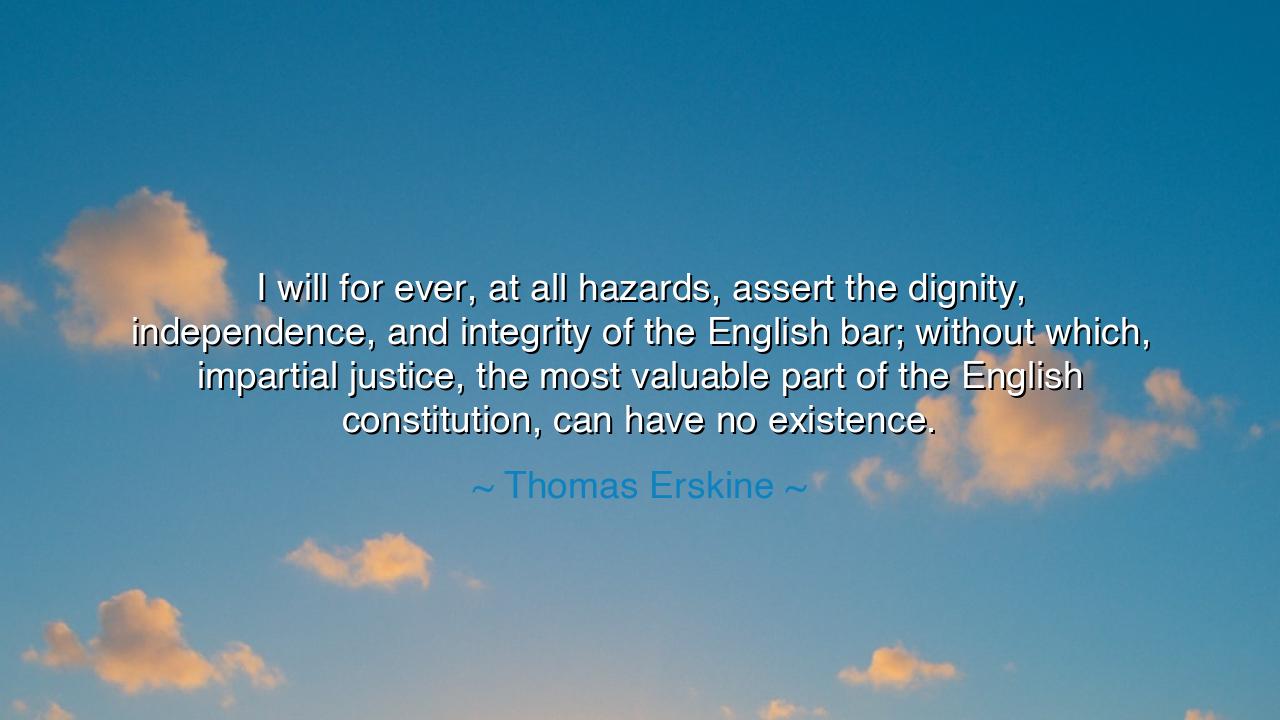
I will for ever, at all hazards, assert the dignity
I will for ever, at all hazards, assert the dignity, independence, and integrity of the English bar; without which, impartial justice, the most valuable part of the English constitution, can have no existence.






The words of Thomas Erskine burn with the fire of principle and the majesty of moral courage. When he declared, “I will for ever, at all hazards, assert the dignity, independence, and integrity of the English bar; without which, impartial justice, the most valuable part of the English constitution, can have no existence,” he was not merely defending a profession—he was defending the very soul of freedom. His words are a testament to the sacred duty of those who speak in the courts of law, a reminder that justice cannot survive without men and women who serve truth before power, and conscience before convenience.
To understand the origin of this quote, we must travel back to the late 18th century, when Thomas Erskine, one of Britain’s greatest advocates, stood at the center of political turmoil. It was an age of revolution and fear—the American colonies had just broken free, and the winds of liberty from France were shaking the foundations of monarchy. In Britain, the government grew suspicious of dissent; trials for treason and sedition multiplied, and the cry for order threatened to drown the voice of freedom. Erskine, though a loyal subject of the Crown, believed that the lawyer’s allegiance was first to justice, not to government. It was during such a storm that he vowed, “at all hazards,” to defend the independence of the bar, for he knew that once lawyers became the instruments of power rather than its watchdogs, the light of liberty would flicker and die.
The English bar, as Erskine understood it, was not simply a guild of advocates—it was a pillar of civilization. It stood as the guardian between the individual and the state, the defender of the weak against the mighty, the interpreter of law against tyranny. In his day, to assert such independence was dangerous; it meant risking royal displeasure, career, and even life. Yet Erskine spoke boldly, knowing that justice is impartial only when those who serve her are free from fear. If the bar bowed to kings, if the advocate spoke not truth but flattery, then the court would become a theater of oppression, and the constitution—a hollow shell. Thus, he declared that without the dignity, independence, and integrity of those who plead before the law, justice itself could not exist.
One of Erskine’s greatest acts of courage came in 1792, when he defended Thomas Paine, author of The Rights of Man. Paine had written in defense of liberty and equality, ideas that terrified the British establishment. The Crown prosecuted him for sedition, and public fury was great. Erskine’s own position as Attorney-General to the Prince of Wales was threatened, yet he stood firm. Before a hostile court, he declared that every man, no matter how unpopular, was entitled to defense—that truth and justice must be defended even when the multitude cries for silence. Though he lost his office for his stand, he preserved something greater: the moral authority of the English bar. His courage became legend, a living proof of the vow he made—to assert the dignity, independence, and integrity of his calling, even at hazard to himself.
In the style of the ancients, we may say: a civilization is measured not by its wealth or armies, but by the purity of its justice. And justice, like a flame, must be guarded by those who refuse to let it be corrupted by fear or ambition. Erskine’s words remind us that institutions, no matter how noble, depend upon the virtue of the people who serve them. The law can be written with perfection and yet twisted by the hands of cowards. But when the advocate speaks with courage, when the judge listens with fairness, and when the people demand truth instead of comfort—then, and only then, does liberty dwell among men.
The power of Erskine’s declaration endures beyond the courtrooms of England. It speaks to every profession, every citizen, and every generation that faces the temptation of compromise. Dignity, independence, and integrity—these are not virtues of the bar alone; they are the pillars of every free soul. In any walk of life, when these are lost, freedom falters. The teacher who fears to teach truth, the journalist who silences his pen for favor, the citizen who bows to falsehood—all betray the same spirit that Erskine sought to preserve.
Let this lesson be remembered: integrity is the fortress of justice, and courage is the price of freedom. A nation’s laws may change, but its moral foundation must not. Defend what is right even when it costs you dearly; speak truth even when it trembles on your lips. For the dignity of your profession, the independence of your conscience, and the integrity of your actions are the shields that guard the flame of justice in every age.
And so, the practical path is this: stand firm in the place where fate has set you. Refuse to bend your principles for power or favor. Be, as Erskine was, a voice for truth amid the storm. For in every court, every council, every corner of life, there is always a battle between fear and righteousness—and the victory belongs, eternally, to those who will “at all hazards” defend the sacred cause of justice.






AAdministratorAdministrator
Welcome, honored guests. Please leave a comment, we will respond soon